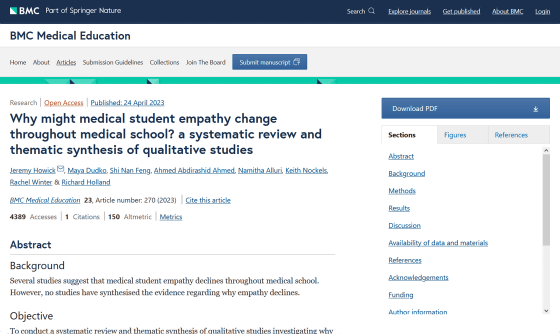Pointed out that the educational curriculum of medical students is depriving doctors of `` empathy ''

``Empathy,'' which enables doctors to listen and be close to patients, is important for providing high-quality care to patients, but on the other hand, lack of empathy can lead to medical accidents. It can have dire consequences. In a paper published in the medical education journal BMC Medical Education, it was pointed out that ``the educational curriculum of medical students may be depriving them of empathy as doctors,'' and
Why might a medical student empathy change throughout medical school? a systematic review and thematic synthesis of qualitative studies | BMC Medical Education | Full Text
https://doi.org/10.1186/s12909-023-04165-9

Medical students lose their empathy – here's what can be done about it
https://theconversation.com/medical-students-lose-their-empathy-heres-what-can-be-done-about-it-204327
In the medical field, 'having empathy for the patient's situation' has an important meaning. Mr. Howick said , `` Hundreds of patients died between 2005 and 2009, partly due to lack of empathy at the Mid Staffordshire NHS Foundation Trust , a medical institution in the United Kingdom. ``The lack of empathy was the cause of the deaths of dozens of infants and pregnant women at Shrewsbury and Telford Hospitals,'' said a PDF file) report .
In addition, research results show that ``doctors working night shifts are less likely to empathize with patients' pain, and are less likely to prescribe painkillers.'' A decline in empathy worsens the quality of care for patients. I also know.
Research results show that doctors on the night shift are less likely to prescribe analgesics because their ``sympathy for patient pain'' is dulled-GIGAZINE

Empathy is considered a core skill that medical students who want to become doctors should acquire. It is explained that there is one However, Howick points out, ``The hidden curriculum of medical school can reduce empathy in medical students.''
Howick et al.'s research team analyzed data collected from 771 medical students in 16 studies and examined how the empathy of medical students changes over the course of the educational curriculum. As a result, it was found that medical students encountered a ' hidden informal curriculum ' when they moved from the classroom-based lecture-centered 'first phase' to the clinical-based, patient-facing 'second base.' matter.
Although this curriculum is not explicitly taught to medical students, it is 'a focus on the body as a mechanical structure compared to the 'biopsychosocial model' of disease, which includes psychological and social factors.' Empathy of medical students implicitly in the course of education, such as the relative predominance of the ``biomedical model'' of the disease targeted, and the ``curriculum that creates a stressful workload and is strongly influenced by role-model physicians''. It seems to take power away.
'Students, who may have had little or no experience with patients, often adapt to this hidden curriculum by becoming cynics, emotionally distant from patients, and deliberately desensitized,' Howick said. , it reduces empathy.”

Mr. Howick proposes the following interventions for students in order to create an educational program that fosters empathy in medical students.
1: Increase the curriculum that can be considered from the patient's point of view
By spending the night in the emergency room where many patients are brought in, and trying to move around in a suit that reproduces the physical decline associated with aging, medical students can put themselves in the patient's shoes. you will be able to
2: Balancing the biomedical and biopsychosocial models
An educational balance between the biomedical model and the biopsychosocial model helps patients understand that they are coming to a clinic with a variety of physical, psychological and social problems. Understanding the biomedical model can help us tailor treatments to our patients' problems.
3: Talk to real patients
At the timing when we learned about the objective facts of the body, we will bring actual patients into the lecture room and interact with the students. Combining scientific facts with patient stories can reduce the shock of moving from the classroom to the clinical setting.
4: Evidence-based empathic communication training
Medical schools already teach patient communication skills, but by helping them develop more empathic communication skills, they can improve the quality of care they provide. These include showing understanding of the patient, showing empathy by nodding or leaning forward, and being optimistic.
5: Enhance the empathy of role model doctors
Medical students are strongly influenced by their role model physicians, and if their physicians demonstrate strong empathy for their patients, they can have a positive impact on medical students as well.

Related Posts:
in Science, Posted by log1h_ik







